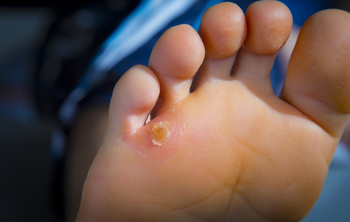 Plantar warts are caused by HPV and normally take the form of small growths that appear as lesions on the weight-bearing regions of one’s foot. While they are not seen as a serious health concern, it is important to treat these warts to maintain the health of your feet. Plantar warts most commonly affect children and teenagers, those with weak immune systems, and those who tend to walk barefoot on wart-causing surfaces like locker rooms. If you notice your lesion is bleeding, painful, or has changed color, it is recommended that you consult with a podiatrist. If the warts do not go away on their own or keep returning, and you are experiencing discomfort with normal activities, it is also advised you seek further help. Keeping your feet clean and dry, avoiding picking at your warts, and changing your shoes and socks daily are a few ways to help prevent plantar warts from appearing. If you would like to seek further information about plantar warts or would like the assistance of a professional to treat your plantar warts, we recommend you consult with a podiatrist.
Plantar warts are caused by HPV and normally take the form of small growths that appear as lesions on the weight-bearing regions of one’s foot. While they are not seen as a serious health concern, it is important to treat these warts to maintain the health of your feet. Plantar warts most commonly affect children and teenagers, those with weak immune systems, and those who tend to walk barefoot on wart-causing surfaces like locker rooms. If you notice your lesion is bleeding, painful, or has changed color, it is recommended that you consult with a podiatrist. If the warts do not go away on their own or keep returning, and you are experiencing discomfort with normal activities, it is also advised you seek further help. Keeping your feet clean and dry, avoiding picking at your warts, and changing your shoes and socks daily are a few ways to help prevent plantar warts from appearing. If you would like to seek further information about plantar warts or would like the assistance of a professional to treat your plantar warts, we recommend you consult with a podiatrist.
Plantar warts can be very uncomfortable. If you need your feet checked, contact Jim Maxka, DPM from South Penn Foot & Ankle Associates. Our doctor will assist you with all of your foot and ankle needs.
About Plantar Warts
Plantar warts are the result of HPV, or human papillomavirus, getting into open wounds on the feet. They are mostly found on the heels or balls of the feet.
While plantar warts are generally harmless, those experiencing excessive pain or those suffering from diabetes or a compromised immune system require immediate medical care. Plantar warts are easily diagnosed, usually through scraping off a bit of rough skin or by getting a biopsy.
Symptoms
- Lesions on the bottom of your feet, usually rough and grainy
- Hard or thick callused spots
- Wart seeds, which are small clotted blood vessels that look like little black spots
- Pain, discomfort, or tenderness of your feet when walking or standing
Treatment
- Freezing
- Electric tool removal
- Laser Treatment
- Topical Creams (prescription only)
- Over-the-counter medications
To help prevent developing plantar warts, avoid walking barefoot over abrasive surfaces that can cause cuts or wounds for HPV to get into. Avoiding direct contact with other warts, as well as not picking or rubbing existing warts, can help prevent the further spread of plantar warts. However, if you think you have developed plantar warts, speak to your podiatrist. He or she can diagnose the warts on your feet and recommend the appropriate treatment options.
If you have any questions please feel free to contact our office located in Hanover, PA . We offer the newest diagnostic and treatment technologies for all your foot and ankle needs.
